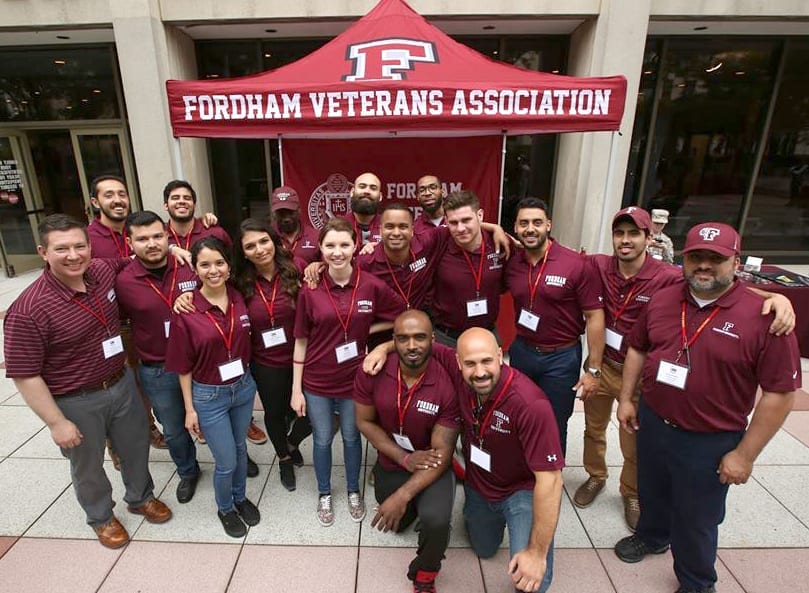By Michael Gabriele
November 11, 2018 — Hank Gillen, director of the Office of Veterans Services at Saint Joseph’s University in Philadelphia, recently had to cover his other ear while on the phone with a prospective student. His caller was on an aircraft carrier in the Sea of Japan. Needless to say, veterans can face some significant challenges when seeking guidance for higher education or assistance landing a civilian job.
Jesuits have always been known for accompanying those in need, especially when providing access to education. So it is unsurprising that Jesuit universities are recognized by many veterans’ associations as exemplary when it comes to reaching out and helping veterans succeed in both their educational and their life goals.

The Fordham Veterans Association keeps its vets connected and involved.
“We go far beyond helping veterans and their families gain an education,” said Hank Gillen, an Army veteran himself. “It is the breadth of our services that differentiates Saint Joseph’s University.” From financial assistance and resolving related issues, to facilitating internships and finding the right fit for job opportunities, SJU is a true partner for veterans, targeting suitable course programs and career paths based on their strengths and interests. “Right now, our graduate programs in criminal justice are very popular with veterans, but we are also seeing an interest in the writing program and an increased interest in computer science.”
Saint Joseph’s University is also the only Catholic university in a consortium of 10 U.S. universities to offer an Entrepreneurship Bootcamp for Veterans (EBV) that provides the tools, education and mentorship necessary for them to start or grow their own businesses. With faculty leadership from the SJU Haub School of Business, along with industry practitioners from the Philadelphia business community, veterans with dreams of running their own businesses can attain the necessary skills for a successful launch and long-term growth.
Matt Butler, director of military and veterans’ services at Fordham University in the Bronx, New York, and a veteran himself, understands the nuances that can make transitioning into civilian education and careers a challenge for vets. “Veterans have a special bond with their brothers and sisters in the military,” he explained. “While serving their country, their entire focus is on the collective team and the unit as a whole, and that reality is lost when they return. We help them shift their center of attention onto their personal strengths and accomplishments when planning their education and interviewing for jobs.”
Support and guidance are just as important as academics for veterans. Many of them are first-generation college students without the family support others have when applying to a university or navigating course work and a career path. “Our veterans at Fordham span from 20 to 60 years old,” said Butler. “Oftentimes, simply finding them a roommate in New York and connecting them with fellow vets in our program can greatly ease their stress and allow them to focus on their education and discern what they want to do, which many aren’t sure of when they get here.”

Veterans enrolled in the Entrepreneurship Bootcamp at Saint Joseph’s University were especially engaged with the university’s recent Vietnam retrospective photo exhibit.
Connections seem to be the key — connecting veterans with the appropriate student groups, fields of study, internship opportunities and job interviews — and then mentoring them through the gauntlet of hoops that spring up along the way. “Their success rate is very high if they can make that transition into the civilian job market, and they make such good business owners,” added Butler. “You won’t find more dedicated workers committed to success than military veterans.”
Georgetown University in Washington, D.C., certainly understands this concept. It partners with Dog Tag Bakery, a popular bakery and coffee shop right in the heart of Georgetown co-founded by the late Fr. Rick Curry, SJ, who spent his life helping those with disabilities. Dog Tag Bakery’s mission is to empower service-disabled veterans, military spouses and caregivers to discover personal and professional fulfillment in the civilian world.
While the bakery does employ some veterans looking for work, the real support happens upstairs, above the shop. A five-month fellowship program provides service-disabled veterans, military spouses and their caregivers the hands-on assistance needed to effectively re-enter the workforce or become successful entrepreneurs themselves. At the conclusion of the program, graduates get a certificate in business administration from Georgetown University’s School of Continuing Studies. It is truly a living business school.

Service-disabled veterans tap Dog Tag Bakery and Georgetown University for real-world experience and business training.
“It’s not just about a job or about going back into education,” said Meghan Ogilvie, chief executive officer of Dog Tag Bakery. “It’s really about helping our veterans find purpose again and find a mission.”
The U.S. Department of Veterans Affairs has recognized that suicides among military veterans have become a national public health issue. In the Jesuit tradition of accompaniment, reaching out to these servicemen and women to help them attain an education, confidence in their potential and an eagerness to live life to the fullest is a true act of discipleship. “These programs for our veterans are like a partnership — a very high-touch experience that looks at their whole person,” specified Gillen. “It’s very Ignatian.” [Source: Maryland Province]
